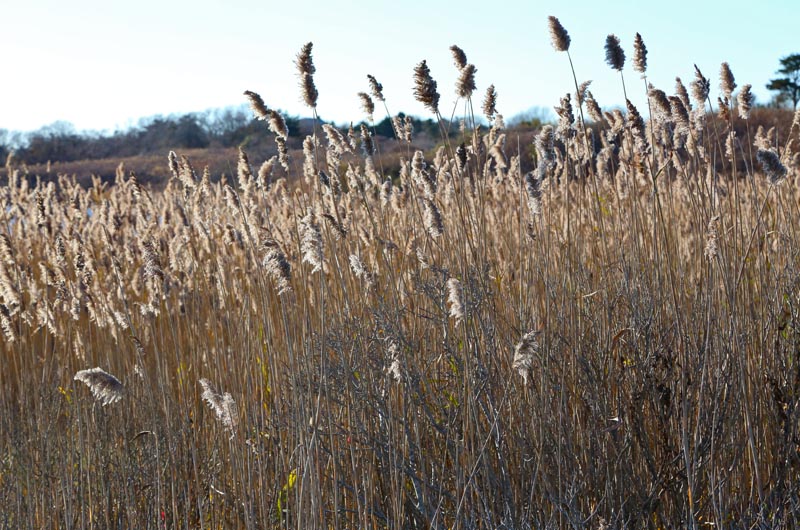A two-year effort by a group of Chilmark landowners to use herbicides to combat the invasive weed phragmites in Squibnocket Pond came to an end this week with a brief judgment by a justice of the state Land Court.
The Hon. Gordon H. Piper on Monday vacated his own ruling from last January that had found a Chilmark bylaw banning herbicides on the pond was not valid because it was more restrictive than the state Pesticide Control Act.
Justice Piper noted that his earlier decision had been rendered moot by a special act of the legislature signed into law in November that specifically exempts Squibnocket Pond from the state pesticide law. The special legislation sought by the town of Chilmark does not bar herbicide use elsewhere on the Island.
Chilmark town counsel Ronald H. Rappaport called the decision “a victory for the town’s right to protect its own natural resources,” and credited state Rep. Timothy Madden and Sen. Daniel Wolf with championing the town’s interests in the legislature.
“Squibnocket Pond is one of Chilmark’s treasures, and town voters have indicated repeatedly over many years that it should be treated with extra care,” he told the Gazette.
Chilmark resident Charlie Parker, one of six riparian landowners who make up the Squibnocket Pond Organization, said the group agreed to the judge’s action, acknowledging that Chilmark voters have made it clear that they don’t want herbicides used in Squibnocket Pond to control invasive plants.
“While we believe that the method we proposed to control phragmites has been proven to be both effective and safe, the voters did not agree. We have accepted that,” Mr. Parker said.
Phragmites australis, also known as common reed, is a non-native species that has become an increasing menace to wetlands throughout the country, especially on the East Coast. A tall, dense grass, the fast-growing phragmites crowd out native plants such as cattails, making habitats less hospitable to other forms of life. Managing the plants is difficult because they reproduce both by seed and via underground rhizomes. In order to eradicate the weeds fully, all the rhizomes must be eliminated.
On its website (squibnocketpond.org), the Squibnocket Pond Association says that phragmites apparently took root in the pond in 1991, in the wake of Hurricane Bob. A survey map of the site dated 2010 shows that the weed had spread to 20 different locations, covering at least four acres of shoreline.
“We are concerned that the spreading of phragmites will result in the loss of a significant portion of shallow, ‘open water’ in the eastern section of the pond where the water is between 2 feet and 3 feet deep, possibly as much as 50 acres of the Pond,” the website notes. “As important, the plants are destroying native species, reducing the Pond to a monoculture where few native plants or animals will survive.”
There are currently no biological control agents available for treatment of phragmites. While careful mowing, covering with plastic and increasing water salinity can help manage infestations, herbicides containing the active ingredient glysophate are considered the only truly effective method for eradication. On the Vineyard, successful phragmites elimination projects have been undertaken at Crystal Lake in Oak Bluffs, Black Point Pond in Chilmark, Edgartown Great Pond and Chilmark Pond. All the projects centered on the use of the herbicide Rodeo, which contains glysophate. Glysophate acts on plant enzymes to inhibit growth.
But Chilmark has long resisted herbicide use around Squibnocket Pond, contending it is more fragile than the Island’s other great ponds, in part because it is not regularly flushed by the ocean. As early as 1989, the town undertook an environmental assessment of Squibnocket Pond, which led to the adoption in 1990 of an overlay planning district bylaw that among other things restricts the use of chemical fertilizer, fungicides, herbicides and pesticides within 500 feet of the pond.
Still, when the Squibnocket Pond Association sought approval in January 2013 from the Chilmark Conservation Commission to use Rodeo on 20 phragmites colonies, the request was approved. Later, building inspector Leonard Jason Jr. refused to issue a permit on the basis of the town bylaw, and his position was upheld in May 2013 by the Chilmark Zoning Board of Appeals. The association appealed to the Land Court, and in a Jan. 8, 2014 decision Justice Piper overruled the town, finding that the state Pesticide Control Act superseded the bylaw.
Thwarted on the judicial level, Chilmark voters at the annual town meeting in April agreed unanimously to seek a special act from the legislature exempting Squibnocket Pond from the state pesticide law. The town also submitted affidavits from two environmental scientists, Charles Benbrook and Arthur G. Gaines Jr., describing the fragile nature of the pond. In a letter of support for the special bill, Mr. Rappaport described the detailed study that went into creating the Squibnocket Overlay District in 1990. Among other things, he noted that Chilmark lacks a public water supply and that there are 74 private wells near or in the overlay district.
Sponsored by Rep. Madden and Sen. Wolf, House Bill 4339 was passed and signed into law on Nov. 14.
In a response to the recent decision, the Squibnocket Pond Organization plans to look to the future.
“While we are disappointed, we will have to wait and see whether an organic method to control these plants is developed,” Mr. Parker said.







Comments (14)
Comments
Comment policy »